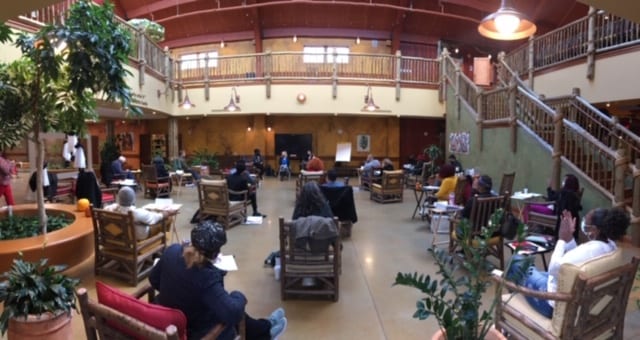How BizStarts Institute supports a different kind of Wisconsin entrepreneur
 Innovation. Disruption. Venture capital. These might be the terms that come to mind when you think about entrepreneurship. Wisconsin’s high-profile startups and entrepreneurs are excelling in industries like advanced manufacturing, information technology and life sciences. But this model of entrepreneurship—requiring a lot of education, capital and resources—is only one part of the startup story.
Innovation. Disruption. Venture capital. These might be the terms that come to mind when you think about entrepreneurship. Wisconsin’s high-profile startups and entrepreneurs are excelling in industries like advanced manufacturing, information technology and life sciences. But this model of entrepreneurship—requiring a lot of education, capital and resources—is only one part of the startup story.
Equally important to Wisconsin’s economic well-being are the aspiring small business owners whose goal is not to disrupt an entire industry or develop a revolutionary new technology, but rather to make a living and create opportunities in a neighborhood where options are limited. It’s those entrepreneurs that Milwaukee’s BizStarts has turned its attention to over the last few years.
When BizStarts launched more than a decade ago, there were no entrepreneurship programs at Wisconsin universities. There was no gener8tor, no TitletownTech, no VentureHome. There was, says BizStarts Executive Director Patrick Snyder, “a real need for coaching and mentoring as students get out of college, and a need for people to get advice on scaling their businesses.”
Today, with university-based entrepreneurship education, startup accelerators and business incubators increasingly common, BizStarts is evolving and changing its focus to entrepreneurship as a means for self-employment in underserved areas—and this evolution led to the formation of the BizStarts Institute.
Proven program
When considering other programs to model the BizStarts Institute after, the organization was determined to find a program with a proven track record.
For guidance, they turned to Michael Morris, a professor at the University of Notre Dame who is a world-renowned expert on entrepreneurship in adversity. He has developed successful entrepreneurship programs for people in poverty around the world and helped BizStarts do the same. He continues to be involved with the program and is also the organization’s vice president of learning and research.
At first glance, BizStarts Institute looks a lot like any other pre-revenue startup accelerator. It’s a six-week program that gives participants hands-on guidance in business fundamentals, from developing a viable business concept and identifying audiences to marketing and profit models.
But unlike programs that end with a pitch day where success is measured by deals made and participants are left to move forward on their own, the six-week program is just the beginning of the support BizStarts offers participants. What makes the program work is the year-long mentorship and support that follows.
Accessible resources
Nearly 70% of BizStarts’ clients live in low-income neighborhoods, and few have the ability to rely on family for bootstrap funding or connections to the wider business community for professional services; BizStarts provides those resources free of charge.
“These folks don’t have any resources. Unlike tech startups, they’d spend themselves out of business creating a website or a simple flier or getting their numbers in QuickBooks,” says Snyder.
Help with basic advertising or website design is provided by Marquette University students. Volunteers from Marquette’s legal clinic and Ernst & Young provide legal advice and financial services. Support comes from within the group as well, with participants often trading services or buying from each other.
Unlike many programs that went virtual, the spring and fall sessions of BizStarts Institute were held in person (but socially distanced) at a community center located in one of Milwaukee’s low-income neighborhoods. In fact, the organization is getting rid of its downtown Milwaukee offices and moving into the communities it serves.
“You don’t get trust if you ask people who don’t have good transportation to get into the city so you can help and support them. Our goal is to be in the neighborhoods,” Snyder says.
Tangible results
The statistics coming out of the BizStarts Institute are impressive. In 2020—a challenging year for any business—37% of the entrepreneurs BizStarts worked with were able to leave their full-time jobs and support themselves through their new business. They also added jobs to the economy, with 23% of them giving at least some work to contractors during the year.
Of the 25 fledgling entrepreneurs that took part in the 2020 cohort, 15 of them are now cash-flow positive, and 10 are already fully self-employed. Just as important, Snyder says, the connections they’re building with each other are helping them build strong businesses.
“The first 25 people who went through the core program meet biweekly. We call it a celebration meeting—they have to tell us what they’ve done to move their business along over the last two weeks, so there’s accountability,” Snyder says. “We’re creating a family.”
For more information on the program, how to apply and learn about the other services BizStarts offers aspiring entrepreneurs, visit the BizStarts website.
Legal Disclaimer:
EIN Presswire provides this news content "as is" without warranty of any kind. We do not accept any responsibility or liability for the accuracy, content, images, videos, licenses, completeness, legality, or reliability of the information contained in this article. If you have any complaints or copyright issues related to this article, kindly contact the author above.
